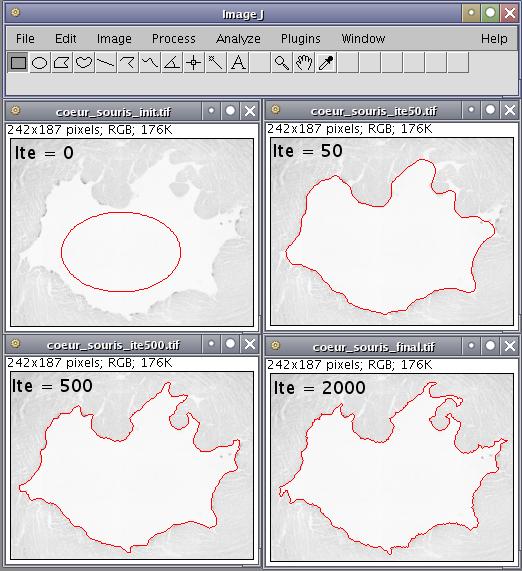Active contour (Snake)
Semi-automatic segmentation by active contours.
Download and copy absnake_.jar into you plugins directory
- draw the roi (freehand, ellipse, rectangle, polygon or straight line) close to the contour you want to detect (either inside or outside). For multiple snakes draw rois and add them to the RoiManager.
- start the ABSnake plugin
- select the threshold to find edges (you can use the Edge Detection plugin to view the edges image)
- choose the number of iterations and the step to display intermediate results
- for stacks choose the first and last slice to process (can be in reverse order)
- choose the color to draw the snake
- check if you want to save the coordinates (into the default ImageJ directory : into files called ABsnake-ri-zi.txt and in .roi files)
- check if you want to create a segmented binary image
- In Advanced Options check for advanced parameters :
- Distance search for contours
- Minimum and maximum displacements of points at each iteration
- Minimum and maximum alpha value for Deriche filtering (inverse values)
- Maximum distance to find and edges (used for growing or shrinking snakes)
- Minimum and maximum regularization values
- Multiplicative factors to modify the above values
- runs also for stacks, in this case the initialization for slice i+1 can be either original roi or snake found at i (use propagate option).
The source is available as a jar file below absnake-src (unzip it) or on GitHub.
New options were added by Feel Contraire in absnake2 :
- It now accepts type 4 rois like those from Analyze Particles.
- It allows to save each iteration Roi.
- It allows setting other folder to save the rois, coords and images.
- Swapped the name order of the savings: first roi number, then iteration number.
Links:
The plugin was applied to segmentation and quantification of visceral, subcutaneaous and total abdominal adipose tissue, acquired with magnetic resonance imaging. See the AATAP plugin.
References:
P. Andrey, T. Boudier, Adaptive Active Contours, ImageJ Conference 2006 (absnake.pdf)
T. Boudier, Elaboration d'un modèle de déformation pour la détection de contours aux formes complexes, Innov. Techn. Biol. Med., Vol 18, n°1, 1997.
Contact me for any questions or suggestions : 
| Filename | Filesize | Last modified |
|---|---|---|
| absnake-src.jar | 15.3 KiB | 2019/04/12 13:17 |
| absnake.pdf | 208.8 KiB | 2019/04/12 13:17 |
| absnake2_.jar | 61.1 KiB | 2019/04/12 13:17 |
| absnake_.jar | 38.8 KiB | 2019/04/12 13:17 |
